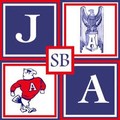In Memory

.jpg)
John Ray
Jun. 4, 1926 - Nov. 14, 2007
He breezed into Lexington from football powerhouse Notre Dame and pledged to produce winning football teams at the University of Kentucky.
Although his win-loss tally was a disappointing 10-33 when he left four years later, John Ray's legacy at UK was much more than a losing record.
He played a major role in getting Commonwealth Stadium built and he set the stage for victory for his successor.
Mr. Ray, UK's head football coach from the 1969 season through the 1972 season, died at his home in Granger, Ind., Wednesday of complications from cardiopulmonary disease and congestive heart failure. He was 81.
"He was probably the most pleasant person I've ever known, the most optimistic," said Russell Rice, a former UK sports information director and the author of several books on UK sports. Mr. Ray's team could get beaten by 50 points on a Saturday, but by Tuesday, his spirits were flying high, Rice said.
"He could bounce back that quick."
Mr. Ray came to Kentucky expecting to win the Southeastern Conference, but he didn't realize he didn't have the players, Rice said.
Nevertheless, there were some notable games during his tenure as UK's football coach.
Perhaps the biggest victory of his career at UK came in 1969 when the Wildcats defeated Mississippi and All-American quarterback Archie Manning 10-9 at UK's Stoll Field. Another notable game came in 1970 when the Wildcats upset Kansas State.Among the notable players recruited by Mr. Ray was running back Sonny Collins from Madisonville.
Mr. Ray "brought a lot of courage to the Kentucky camp," said Buzz Burnam, who was a defensive back at UK during Mr. Ray's time as coach.
"He signed six African-American scholarship athletes, the most ever at UK at one time," Burnam said. "In previous years, there'd been maybe one, two, two, and all of a sudden here we came...six. It took courage to do that in" the SEC, where there were very few blacks." Mr. Ray started a trend, not only at UK, but in the SEC for bringing in black athletes in abundance, he said.
Burnam said that Mr. Ray's defensive teams were "stellar."
"We could stop teams, but we couldn't score points. We just didn't have any depth at that time."
Off the field, Mr. Ray was a father figure to the players, Burnham said.
"He groomed you to think about life after football," he said. He said the coach would ask players: "When the ball goes flat, what are you going to do?"
Said former UK player Joe Federspiel, a captain on the 1971 team: "Coach Ray had a great big deep voice, and he scared the heck out of everybody."
But, he said, "He made a big impact on me, as far as knowing the game of football and how to handle myself." Federspiel went on to play for the New Orleans Saints and the Baltimore Colts in the National Football League.
Mr. Ray "got along famously" with legendary UK basketball coach Adolph Rupp, "which was something for a football coach," Rice said. "Rupp thought the world of him."
But the media did not treat Mr. Ray kindly, "although he buttered them up," Rice said. "Nobody treats a loser kindly, but he was so reachable."
Mr. Ray's motto was "We Believe" as he coached and campaigned for a new stadium at UK.
UK's Stoll Field "looked like a little high school stadium," compared to the football stadiums at other schools, Burnam said. Mr. Ray was a major factor in UK getting Commonwealth Stadium, Rice said.
"He just plugged it everywhere he went, and he was a very good salesman."
Mr. Ray, a Detroit native who grew up in South Bend, Ind., played fullback and center on the 1944 Notre Dame football team, and he later played on the Olivet College football team. After receiving a bachelor's degree in history from Olivet, he coached at Sturgis and Three Rivers high schools in Michigan, and later he was an assistant at the University of Detroit. He was head football coach at John Carroll University in Cleveland from 1959 to 1963. He worked under Notre Dame coach Ara Parseghian as a defensive line and linebackers coach and as assistant head coach from 1964 to 1968.
He was hired to succeed UK coach Charlie Bradshaw in late 1968.
Mr. Ray left Kentucky in late 1972 after the university's athletics board voted against renewing his contract.
When he left, UK had a new stadium under construction and had a crop of capable senior football players and recruits for Mr. Ray's successor, Fran Curci. Curci's team went 5-6 in his first season.
Mr. Ray went on to become defense coordinator of the Buffalo Bills.
In later years he was executive vice president of Ara Parseghian Enterprises, an insurance business in South Bend.
Mr. Ray, whose first wife, Barbara Ray, died in 2002 after the couple had been married 57 years, is survived by his second wife, Norah Ray; two sons, Jeff Ray of Las Vegas and Chris Ray of Scottsdale, Ariz.; two daughters, Kathy Stscherban of Mishawaka, Ind., and Deborah Kane of Pittsburgh; a stepdaughter, Leslie A. McCurdy of South Bend; a stepson, Nicholas Linarello of South Bend, Ind.; nine grandchildren; and a stepgrandchild.
Services will be at 11 a.m. Saturday at St. Pius X Catholic Church in Granger. Visitation will be after 9:30 a.m. Saturday at the church. Memorial gifts are suggested to Special Olympics of St. Joseph County, Ind., or one's favorite charity.
(Lexington Herald Leader on 11/18/2007)
04/11/2021 DEC
|
